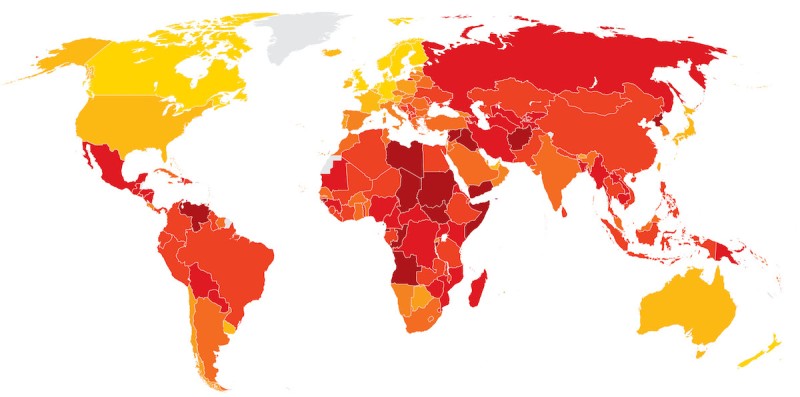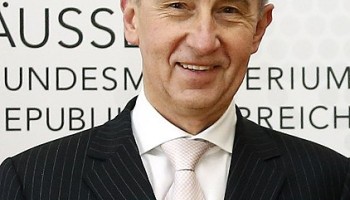Since 2006, 113 countries have declined in their democracy score.
“With many democratic institutions under threat across the globe – often by leaders with authoritarian or populist tendencies – we need to do more to strengthen checks and balances and protect citizens’ rights,” said Patricia Moreira, Managing Director of Transparency International (TI).
The CPI claims a direct link between corruption and the level of democracy in a country, wherein full democracies averaged 75 on the corruption index and autocratic regimes just 30.
Exemplifying this trend, the CPI score for Hungary decreased by eight points over the last five years, while the country registered its lowest score for political rights since the fall of communism in 1989. Turkey slipped down by nine points in the CPI, and was downgraded from ‘partly free’ to ‘not free’.
The watchdog makes the point that, while “high corruption rates can contribute to increased support for populist candidates,” 40 percent of populist leaders worldwide are also indicted on corruption charges.
“Corruption chips away at democracy to produce a vicious cycle, where corruption undermines democratic institutions and, in turn, weak institutions are less able to control corruption,” Moreira explained.
On a scale of zero (a highly corrupt public sector) to 100 (a very clean public sector), two thirds of countries out of the 180 surveyed have scored below 50 in 2018’s CPI – meaning the majority pass as corrupt.
The two lowest ranking regions were Sub-Saharan Africa, with an average score of 32, and Eastern Europe and Central Asia, with an average of 35. Countries that have declined in score in the latter region include Azerbaijan, scoring 25, and Russia, 28.
"A general lack of political will, weak institutions, and few political rights create an environment where corruption flourishes with little opposition," says the report.
However, the watchdog warns that being at the top of the index doesn’t make a country corruption free. Denmark, ranked first on the CPI with a score of 88, has nevertheless seen its share of corruption, with the money-laundering scandal surrounding Danske Bank the most high-profile case.
While only 20 counties have improved, the rest have either stagnated or declined since 2012. The only country to fall out of the top ten since 2017 is the United Kingdom – having fallen from eighth place to eleventh. This year is the first time the UK has declined on the index since 2012.
TI credits this to the public sector scandals, wherein certain Members of Parliament were found to have taken undeclared holidays paid for by countries where corruption is rampant, such as Azerbaijan and Sri Lanka. Further, questions over the origin of money used in the EU referendum have not been answered satisfactorily.
Another high-scorer in the democracy index is said to have “significantly declined.”
Australia, which scored 77, lacks strong, independent institutions to deliver the checks and balances which ensure corruption-free democracies, according to TI. While a federal anti-corruption body is now in the works, the proposed model has been labeled inadequate.
TI also suggests that Australia shares a “strong-handed central government that limits or suppresses free and open media and citizen participation” with its neighbours Timor-Leste (35), Bangladesh (26), Maldives (31) and Vietnam (33).
The Guardian Australia dubbed Australia’s policy for media reporting on the Manus Island and Nauru detention centers “draconian”, while changes to legislation were previously proposed seeking to imprison whistleblowers and journalists who report on leaked information for up to 20 years.
Meanwhile, TI warns Western Europe and the EU that “stagnation and complacency are not an option” if the region is to live up to its reputation as the “gold standard of integrity.”
“While democratic institutions are in place across the region, political will and enforcement is
missing,” says the CPI.
Countries such as Bulgaria, with a score of 42, and Hungary, with a score of 46, drag the region’s average score down. In Hungary “populist rhetoric is often used to discredit public scrutiny” and the country is now subject to EU measures which strip the country of its EU voting rights. Nevertheless, Western Europe and the EU remains overall the best performing region in the CPI.
The watchdog recommends the region can make good on its anti-corruption commitments by strengthening protections for whistle-blowers, improving legislative transparency as well as access to information required “for effective public oversight”, and better protecting media freedom, among other recommendations.
TI is now focusing on its campaign to hold the Parliamentary Assembly of the Council of Europe accountable for its role in the Azerbaijani Laundromat, as well as on getting the European Parliament and European Commission to commit to more ambitious anti-corruption measures.






